Results 1-11 of 11
<<< Previous 1 Next >>>
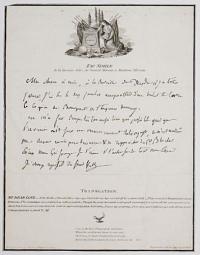
Fac Simile de la Dernière lettre du General Moreau à Madame Moreau.
Engraved by I. Girtin, 330, Oxford Street.
Pub.d Sep.t 30. 1813, by Cox, [D'Angilou] 66 Stafford Place, Pimlico.
Engraving. Verso in ink To the Mrs Spurgeon. Sheet: 245 x 190mm (9¾ x 7½"). Trimmed. Two vertical folds.
A rare image by Girtin of a facsimilie of the last letter sent by Jean Victor Marie Moreau (1763-1813) to his wife, Moreau was mortally wounded during the Battle of Dresden in 1813. Moreau had helped with the rise of Napoleon but he was exiled to the USA in 1804, he returned to Europe and joined forces with his old friend Crown Prince Charles John of Sweden and Tsar Alexander I against the French forces. As well as a facsimilie of the letter the print includes a translation in English and a poem glorifying Moreau.
[Ref: 47006] £170.00
(£204.00 incl.VAT)
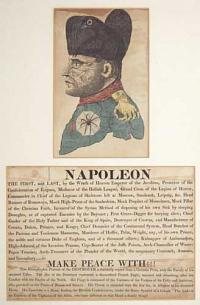
Napoleon. The First, and Last, by the Wrath of Heaven Emperor of the Jacobins, Protector of the Confederation of Rogues, Mediator of the Hellish League, Grand Cross of the Legion of Horror, Commander in Chief of the Legions of Skeletons left at Moscow, Smolensk, Leipzig, &c., Head Runner of Runaways, Mock High-Priest of the Sanhedrim, Mock Prophet of Mussulmen, Mock Pillar of the Christian Faith, Inventor of the Syrian Method of disposing of his own Sick by sleeping Draughts, or of captured Enemies by the Bayonet; First Grave-Digger for burying alive; Chief Gaoler of the Holy Father and of the King of Spain, Destroyer of Crowns, and Manufacturer of Counts, Dukes, Princes, and Kings; Chief Douanier of the Continental System, Head Butcher of the Parisian and Toulonese Massacres, Murderer of Hoffer, Palm, Wright, nay, of his own Prince the noble and virtuous Duke of Enghien, and of a Thousand others; Kidnapper of Ambassadors, High-Admiral of the Invasion Praams, Cup-bearer of the Jaffa Poison, Arch-Chancellor of Waste-Paper Treaties, Arch-Treasurer of the Plunder of the World, the Sanguinary Coxcomb, Assassin, and Incendiary......to / MAKE PEACE WITH !!! / This Hieroglyphic Portrait of the DESTROYER is faithfully copied from a German Print, with the parody of his assumed titles. The Hat of the Destroyer represents a discomfited French Eagle, maimed and crouching, after his Conflict with the Eagles of the North. His Visage is composed of the Carcases of the Victims of his Folly and Ambition, who perished on the Plains of Russia and Saxony. His Throat is encircled with the Red Sea, in Allusion to his drowned Hosts. His Epaulette is a Hand, leading the Rhenish Confederation, under the flimsy Symbol of a Cobweb. The Spider is an Emblem of the Vigilance of the Allies, who have inflicted on That Hand a deadly Sting!'
[Harrison & Leigh Printers, 375 Strand.]
Published at R. Ackermann's, 101, Strand, London [n.d., c.1811].
Rare coloured etching and letterpress. Sheet 485 x 300mm (19 x 11¾"), paper watermarked 'J Whatman 1811'. Damaged and cut with some loss.
An important piece of anti-Napoleon propaganda, featuring a composite portrait made up of details of Bonaparte's 'sins', with explanatory letterpress underneath. Based on a print by Johann Michael Voltz, it is one of the most widespread depictions of Napoleon. Versions were produced in nine European countries, twenty-three in Germany alone. BM Satires 12002.
[Ref: 55808] £350.00
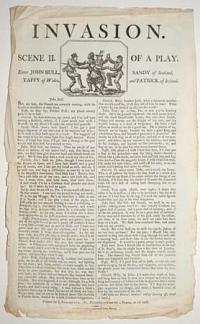
Invasion. Scene II of a Play. Enter John Bull, Sandy of Scotland, Taffy of Wales, and Patrick of Ireland.
Printed for J. Stockdale, 181, Piccadilly S. Gosnell, Printed, Little Queen Street, Holborn.
London, 1803.
Letterpress. Sheet 425 x 270mm (16¾ x 10¾"). Left, right and lower edges are folded. Slight horizontal fold across centre with small tears at either side, edges some creasing.
A broadside satirising the reactions of Great Britain to the threat of a French invasion, illustrated by characters representing Scotland, Wales, Ireland and England. The dialogue between the four characters is accompanied by a woodcut engraving by John Lee depicting four men in their respective national dress dancing in a circle. Published at a time when tensions were rising between Britain and France as Napoleon was amassing power and influence in Europe while undermining Britain. Great Britain declared war on France out of a 'mixture of economic motives and national neuroses'.
[Ref: 53949] £320.00
![[Broadside against Napoleon]](img-thumbnail/jpegs/53945.jpg)
[Broadside against Napoleon] Address to Irishmen Residing in England. / Fellow Countrymen, The Calamaties which have so lately threatened your native Country, by a few of your Bretheren being misled by the artful Designs of French Spies [...] suffer no the poisonous Language of the Enemies of their Country, however high in Rank, or the vain Promises of the designing Spies of a Corsican Usurper and Murderer [...]
An Irishman, and a Soldier. Craven Hotel, Strand, August 8, 1803.
John Ginger, No. 169, Piccadilly / W Glindon, Printer, 48, Rupert Street, Hay-Market
Letterpress, sheet 435 x 280mm (17 x 11"). Creasing and folds in each corner. Small tears along left and right margins.
Broadside published at the time when fears of an invasion of the British Isles by Napoleon were at their height. This one is specifically addressed to Irishmen resident in England, imploring them to 'be foremost on the Shores of your Island, in repelling a Barbarous and Ferocious Enemy, and save your Wives and Children from their Savage Lust and murderous Hands'. Mention of 'the patriotic Language of a Sheridan (that Ornament of his Country)' refers to Richard Brinsley Sheridan's (1751-1816) strong support of the volunteer corps in the face of Napoleon's imperial expansion. Includes a list of other 'patriotic publications' sold by John Ginger on Piccadilly, including 'Horrors upon Horrors' and 'Publicolia Addresses'. For Ginger's 'Publicolia Addresses' see refs. 10044 and 27538; for Sheridan see ref. 17993.
[Ref: 53945] £320.00

The Prophecy! or, Bonaparte Killed at Last by his Own Troops! A True Story, just brought from Paris [...] This Story is founded on a Dream of Bonaparte [...] The Dream is here given in Verse. [...]
[1803] Printed for J. Hatchard, 190, Piccadilly. 1d. each; 6d. per dozen; or, 3s. 6d. per 100. [Brettell, Printer]
Letterpress, sheet 425 x 315mm (16¼ x 12½"). Creasing on left.
Broadside published at the time when fears of an invasion of the British Isles by Napoleon were at their height. This ballad prophesises Napoleon's death in the wake of an unsuccessful invasion of Britain. As in other broadsides of the period, Napoleon's alleged killing of his own injured soldiers at Jaffa is invoked as evidence of his treachery. In the aftermath, the new rule of France is imagined: 'no more Consuls, Frenchmen shout,/ But King Louis make your Head. / With Moreau, Minister of State,/ Not made Ambition's Fool,/ But choosing a much safer Fate,/ Than over France to rule'. Victor Moreau was forced into exile in the United States by his opposition to Napoleon. The final verses defend Britain's monarchy (with a reference to the revolutionary, Thomas Paine) and the high taxes during the war as a temporary measure necessary to combat Napoleon. Published by John Hatchard (1768-1849), who founded the Piccadilly bookseller still thriving over two hundred years on. For a contemporary portrait of Moreau, see ref. 28221.
[Ref: 33275] £350.00
![[Broadside against Napoleon]](img-thumbnail/jpegs/55836.jpg)
[Broadside against Napoleon] Twenty Thousand Pounds Reward / Middlesex (to wit) / To all Constables [...] / Whereas a certain ill-disposed Vagrant, and common Disturber, commonly called or known by the Name of Napoleon Bonaparte, alias Jaffa Bonaparte, alias Opium Bonaparte [...]
[c.1803] London: Printed for S. Highley, No. 24, Fleet-Street; by B. McMillan, Bow-Street, Covent-Garden (price 1d. or 9d. per dozen). Where may be had Bonaparte; or, The Freebooter; a Patriotic Drama, price One Shilling.
Letterpress, sheet 415 x 260mm (16¼ x 10¼"). Some creasing and small tear on right.
One of many popular broadsides published at the time when fears of an invasion of Britain by Napoleon were at their height. This one offers a reward for the capture of Napoleon, with the aim being to imprison him at the Exeter Change menagerie in the Strand, 'placed in a Certain Iron Cage, with the Ouran Outang, or some other ferocious and voracious animal like himself, for the purpose of being tamed'. To facilitate identification of the French leader, a description of his appearance is provided ('...resembles a great deal in person a Bear-leader, or one of the Savoyards who play on the reeds at Vauxhall') while the stream of 'aliases' given for him (Jaffa Bonaparte, Acre Bonaparte etc) refer to earlier actions in the Napoleonic Wars. According to Ashton, this broadside was 'printed with different headings, so as to sell in different countries'. John Ashton, 'English caricature and satire on Napoleon I'
[Ref: 55836] £250.00
(£300.00 incl.VAT)
![[Broadside against Napoleon]](img-thumbnail/jpegs/53943.jpg)
[Broadside against Napoleon] Sheridan's Address to the People. Our King! our Country! And our God!
[c.1803.] London: Printed for J. Asperne, (Successor to Mr. Sewell,) at the Bible, Crown, and Constitution, No. 32, Cornhill, by T. Maiden, Sherbourn-Lane;1 Price One Penny, or 6s the 100.
Letterpress, sheet 355 x 210mm (14 x 8¼"). Fold in both top and bottom right corners.
Broadside published at the time when fears of an invasion of the British Isles by Napoleon were at their height. Richard Brinsley Sheridan (1751-1816), Irish playwright and politician, wrote 'Pizarro', a play adapted from August von Kotzebue's 'Die Spanien in Peru', which premiered in 1799. Sheridan's play addressed both fears of French invasion and supported the revolutionary aims of the United Irishmen. This 'address to the people' is an amalgamation of several speeches from 'Pizarro', contrasting French and British principles as incompatible. The publisher James Asperne (1757-1820) was best-known for publishing the popular 'European Magazine'. Many of his other broadsides published at this time mention that Sheridan's Address can be purchased from him, demonstrating its great popularity. For 'Pizarro', see refs. 11533 and 17165; for Sheridan see ref. 17993.
[Ref: 53943] £320.00
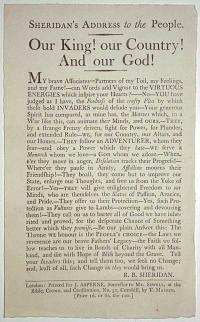
Sheridan's Address to the People. Our King! our Country! And our God!
[c.1803.] London: Printed for J. Asperne, (Successor to Mr. Sewell,) at the Bible, Crown, and Constitution, No. 32, Cornhill, by T. Maiden, Sherbourn-Lane;1 Price One Penny, or 6s the 100.
Letterpress, sheet 340 x 210mm (13½ x 8¼").
Broadside published at the time when fears of an invasion of the British Isles by Napoleon were at their height. Richard Brinsley Sheridan (1751-1816), Irish playwright and politician, wrote 'Pizarro', a play adapted from August von Kotzebue's 'Die Spanien in Peru', which premiered in 1799. Sheridan's play addressed both fears of French invasion and supported the revolutionary aims of the United Irishmen. This 'address to the people' is an amalgamation of several speeches from 'Pizarro', contrasting French and British principles as incompatible. The publisher James Asperne (1757-1820) was best-known for publishing the popular 'European Magazine'. Many of his other broadsides published at this time mention that Sheridan's Address can be purchased from him, demonstrating its great popularity. For 'Pizarro', see refs. 11533 and 17165; for Sheridan see ref. 17993.
[Ref: 55835] £320.00
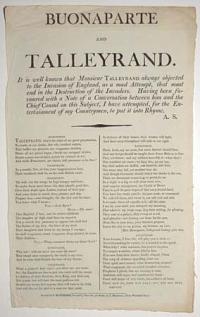
Buonaparte and Talleyrand. It is well known that Monsieur Talleyrand always objected to the Invasion of England, as a mad Attempt, that must end in the Destruction of the Invaders. Having been favoured with a Note of a Conversation between him and the Chief Consul on this Subject, I have attempted, for the Entertainment of my Countrymen, to put it into Rhyme. A.S.
[c.1803] Printed for J. Hatchard, Piccadilly, Price 6d. per dozen, by J.Brettell, Great Windmill Street.
Letterpress, sheet. 440 x 260mm (17 x 10¼"). Creasing across the sheet.
Broadside published at the time when fears of an invasion of the British Isles by Napoleon were at their height. This imagined dialogue presents the diplomat Talleyrand as opposing a planned invasion by Napoleon, who foresees that 'In a night or a fog we will silent steal over,/ And surprize unexpected, the Castle of Dover'. Talleyrand negotiated a short-lived peace in Europe, but was unable to prevent the renewal of hostilities in 1803. With his influence diminishing, and Napoleon's ambition seemingly insatiable, Talleyrand resigned from his role as grand chamberlain in 1807. Published by John Hatchard (1768-1849), who founded the Piccadilly bookseller still thriving over two hundred years on. For a contemporary portrait of Talleyrand, see ref. 28220
[Ref: 53944] £300.00
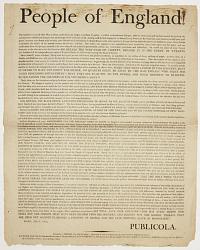
People of England. ... We will save our country - and may every Briton who feels not the insults that have been heaped upon his country, and resents not the bloody threats that are held out against itm become a colonist f france and the ever repining slave of Buonaparte!. Publicola.
London, July 6, 1803. Printed for J.Ginger, No. 169, Piccadilly... D.N.Shury, Printer, Berwick Street, Soho.
Letterpress broadside, paper size 550 x 435mm, 21¾ x 17¾". Stitch holes in left margin; stained at top.
A pro-war broadsheet, published shortly after the demise of the 'Peace of Amiens'. For the 'postscript' see ref. 10044
[Ref: 27538] £490.00
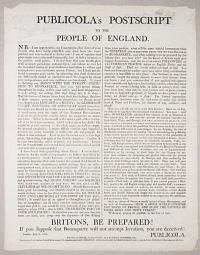
Publicola's Postscript to the People of England. ... If you suppose that Buonaparte will not attempt Invasion, you are deceived!
London, July 18, 1803. Printed for J.Ginger, No. 169, Piccadilly; by D.N.Shury, Berwick Street, Soho.
Letterpress broadside, paper size 550 x 435mm, 21¾ x 17¾". Mounted on album paper.
A pro-government broadsheet, published shortly after the demise of the 'Peace of Amiens'. It argues in favour of the continuation of income tax (introduced by Pitt in 1798) to maintain the army in the face of the Napoleonic threat. It is the 'postscript' to another broadside of the same year. for another Publicola broadsheet see ref. 27538
[Ref: 10044] £690.00
<<< Previous 1 Next >>>



![[Broadside against Napoleon]](img-thumbnail/jpegs/53945.jpg)

![[Broadside against Napoleon]](img-thumbnail/jpegs/55836.jpg)
![[Broadside against Napoleon]](img-thumbnail/jpegs/53943.jpg)



